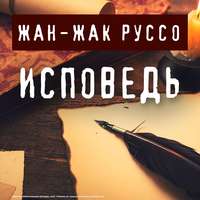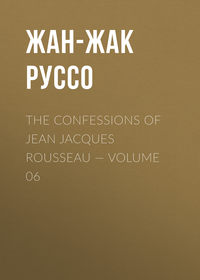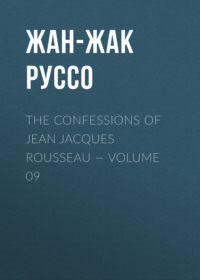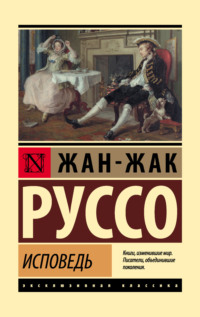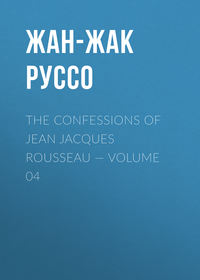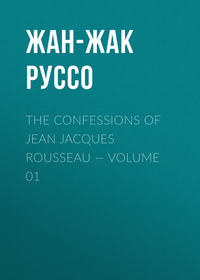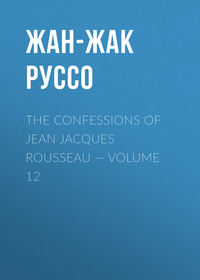 полная версия
полная версияEmile
Treat him, therefore, according to his age, in spite of appearances, and beware of exhausting his strength by over-much exercise. If the young brain grows warm and begins to bubble, let it work freely, but do not heat it any further, lest it lose its goodness, and when the first gases have been given off, collect and compress the rest so that in after years they may turn to life-giving heat and real energy. If not, your time and your pains will be wasted, you will destroy your own work, and after foolishly intoxicating yourself with these heady fumes, you will have nothing left but an insipid and worthless wine.
Silly children grow into ordinary men. I know no generalisation more certain than this. It is the most difficult thing in the world to distinguish between genuine stupidity, and that apparent and deceitful stupidity which is the sign of a strong character. At first sight it seems strange that the two extremes should have the same outward signs; and yet it may well be so, for at an age when man has as yet no true ideas, the whole difference between the genius and the rest consists in this: the latter only take in false ideas, while the former, finding nothing but false ideas, receives no ideas at all. In this he resembles the fool; the one is fit for nothing, the other finds nothing fit for him. The only way of distinguishing between them depends upon chance, which may offer the genius some idea which he can understand, while the fool is always the same. As a child, the young Cato was taken for an idiot by his parents; he was obstinate and silent, and that was all they perceived in him; it was only in Sulla's ante-chamber that his uncle discovered what was in him. Had he never found his way there, he might have passed for a fool till he reached the age of reason. Had Caesar never lived, perhaps this same Cato, who discerned his fatal genius, and foretold his great schemes, would have passed for a dreamer all his days. Those who judge children hastily are apt to be mistaken; they are often more childish than the child himself. I knew a middle-aged man, [Footnote: The Abbe de Condillac] whose friendship I esteemed an honour, who was reckoned a fool by his family. All at once he made his name as a philosopher, and I have no doubt posterity will give him a high place among the greatest thinkers and the profoundest metaphysicians of his day.
Hold childhood in reverence, and do not be in any hurry to judge it for good or ill. Leave exceptional cases to show themselves, let their qualities be tested and confirmed, before special methods are adopted. Give nature time to work before you take over her business, lest you interfere with her dealings. You assert that you know the value of time and are afraid to waste it. You fail to perceive that it is a greater waste of time to use it ill than to do nothing, and that a child ill taught is further from virtue than a child who has learnt nothing at all. You are afraid to see him spending his early years doing nothing. What! is it nothing to be happy, nothing to run and jump all day? He will never be so busy again all his life long. Plato, in his Republic, which is considered so stern, teaches the children only through festivals, games, songs, and amusements. It seems as if he had accomplished his purpose when he had taught them to be happy; and Seneca, speaking of the Roman lads in olden days, says, "They were always on their feet, they were never taught anything which kept them sitting." Were they any the worse for it in manhood? Do not be afraid, therefore, of this so-called idleness. What would you think of a man who refused to sleep lest he should waste part of his life? You would say, "He is mad; he is not enjoying his life, he is robbing himself of part of it; to avoid sleep he is hastening his death." Remember that these two cases are alike, and that childhood is the sleep of reason.
The apparent ease with which children learn is their ruin. You fail to see that this very facility proves that they are not learning. Their shining, polished brain reflects, as in a mirror, the things you show them, but nothing sinks in. The child remembers the words and the ideas are reflected back; his hearers understand them, but to him they are meaningless.
Although memory and reason are wholly different faculties, the one does not really develop apart from the other. Before the age of reason the child receives images, not ideas; and there is this difference between them: images are merely the pictures of external objects, while ideas are notions about those objects determined by their relations. An image when it is recalled may exist by itself in the mind, but every idea implies other ideas. When we image we merely perceive, when we reason we compare. Our sensations are merely passive, our notions or ideas spring from an active principle which judges. The proof of this will be given later.
I maintain, therefore, that as children are incapable of judging, they have no true memory. They retain sounds, form, sensation, but rarely ideas, and still more rarely relations. You tell me they acquire some rudiments of geometry, and you think you prove your case; not so, it is mine you prove; you show that far from being able to reason themselves, children are unable to retain the reasoning of others; for if you follow the method of these little geometricians you will see they only retain the exact impression of the figure and the terms of the demonstration. They cannot meet the slightest new objection; if the figure is reversed they can do nothing. All their knowledge is on the sensation-level, nothing has penetrated to their understanding. Their memory is little better than their other powers, for they always have to learn over again, when they are grown up, what they learnt as children.
I am far from thinking, however, that children have no sort of reason. [Footnote: I have noticed again and again that it is impossible in writing a lengthy work to use the same words always in the same sense. There is no language rich enough to supply terms and expressions sufficient for the modifications of our ideas. The method of defining every term and constantly substituting the definition for the term defined looks well, but it is impracticable. For how can we escape from our vicious circle? Definitions would be all very well if we did not use words in the making of them. In spite of this I am convinced that even in our poor language we can make our meaning clear, not by always using words in the same sense, but by taking care hat every time we use a word the sense in which we use it is sufficiently indicated by the sense of the context, so that each sentence in which the word occurs acts as a sort of definition. Sometimes I say children are incapable of reasoning. Sometimes I say they reason cleverly. I must admit that my words are often contradictory, but I do not think there is any contradiction in my ideas.] On the contrary, I think they reason very well with regard to things that affect their actual and sensible well-being. But people are mistaken as to the extent of their information, and they attribute to them knowledge they do not possess, and make them reason about things they cannot understand. Another mistake is to try to turn their attention to matters which do not concern them in the least, such as their future interest, their happiness when they are grown up, the opinion people will have of them when they are men—terms which are absolutely meaningless when addressed to creatures who are entirely without foresight. But all the forced studies of these poor little wretches are directed towards matters utterly remote from their minds. You may judge how much attention they can give to them.
The pedagogues, who make a great display of the teaching they give their pupils, are paid to say just the opposite; yet their actions show that they think just as I do. For what do they teach? Words! words! words! Among the various sciences they boast of teaching their scholars, they take good care never to choose those which might be really useful to them, for then they would be compelled to deal with things and would fail utterly; the sciences they choose are those we seem to know when we know their technical terms—heraldry, geography, chronology, languages, etc., studies so remote from man, and even more remote from the child, that it is a wonder if he can ever make any use of any part of them.
You will be surprised to find that I reckon the study of languages among the useless lumber of education; but you must remember that I am speaking of the studies of the earliest years, and whatever you may say, I do not believe any child under twelve or fifteen ever really acquired two languages.
If the study of languages were merely the study of words, that is, of the symbols by which language expresses itself, then this might be a suitable study for children; but languages, as they change the symbols, also modify the ideas which the symbols express. Minds are formed by language, thoughts take their colour from its ideas. Reason alone is common to all. Every language has its own form, a difference which may be partly cause and partly effect of differences in national character; this conjecture appears to be confirmed by the fact that in every nation under the sun speech follows the changes of manners, and is preserved or altered along with them.
By use the child acquires one of these different forms, and it is the only language he retains till the age of reason. To acquire two languages he must be able to compare their ideas, and how can he compare ideas he can barely understand? Everything may have a thousand meanings to him, but each idea can only have one form, so he can only learn one language. You assure me he learns several languages; I deny it. I have seen those little prodigies who are supposed to speak half a dozen languages. I have heard them speak first in German, then in Latin, French, or Italian; true, they used half a dozen different vocabularies, but they always spoke German. In a word, you may give children as many synonyms as you like; it is not their language but their words that you change; they will never have but one language.
To conceal their deficiencies teachers choose the dead languages, in which we have no longer any judges whose authority is beyond dispute. The familiar use of these tongues disappeared long ago, so they are content to imitate what they find in books, and they call that talking. If the master's Greek and Latin is such poor stuff, what about the children? They have scarcely learnt their primer by heart, without understanding a word of it, when they are set to translate a French speech into Latin words; then when they are more advanced they piece together a few phrases of Cicero for prose or a few lines of Vergil for verse. Then they think they can speak Latin, and who will contradict them?
In any study whatsoever the symbols are of no value without the idea of the things symbolised. Yet the education of the child in confined to those symbols, while no one ever succeeds in making him understand the thing signified. You think you are teaching him what the world is like; he is only learning the map; he is taught the names of towns, countries, rivers, which have no existence for him except on the paper before him. I remember seeing a geography somewhere which began with: "What is the world?"—"A sphere of cardboard." That is the child's geography. I maintain that after two years' work with the globe and cosmography, there is not a single ten-year-old child who could find his way from Paris to Saint Denis by the help of the rules he has learnt. I maintain that not one of these children could find his way by the map about the paths on his father's estate without getting lost. These are the young doctors who can tell us the position of Pekin, Ispahan, Mexico, and every country in the world.
You tell me the child must be employed on studies which only need eyes. That may be; but if there are any such studies, they are unknown to me.
It is a still more ridiculous error to set them to study history, which is considered within their grasp because it is merely a collection of facts. But what is meant by this word "fact"? Do you think the relations which determine the facts of history are so easy to grasp that the corresponding ideas are easily developed in the child's mind! Do you think that a real knowledge of events can exist apart from the knowledge of their causes and effects, and that history has so little relation to words that the one can be learnt without the other? If you perceive nothing in a man's actions beyond merely physical and external movements, what do you learn from history? Absolutely nothing; while this study, robbed of all that makes it interesting, gives you neither pleasure nor information. If you want to judge actions by their moral bearings, try to make these moral bearings intelligible to your scholars. You will soon find out if they are old enough to learn history.
Remember, reader, that he who speaks to you is neither a scholar nor a philosopher, but a plain man and a lover of truth; a man who is pledged to no one party or system, a hermit, who mixes little with other men, and has less opportunity of imbibing their prejudices, and more time to reflect on the things that strike him in his intercourse with them. My arguments are based less on theories than on facts, and I think I can find no better way to bring the facts home to you than by quoting continually some example from the observations which suggested my arguments.
I had gone to spend a few days in the country with a worthy mother of a family who took great pains with her children and their education. One morning I was present while the eldest boy had his lessons. His tutor, who had taken great pains to teach him ancient history, began upon the story of Alexander and lighted on the well-known anecdote of Philip the Doctor. There is a picture of it, and the story is well worth study. The tutor, worthy man, made several reflections which I did not like with regard to Alexander's courage, but I did not argue with him lest I should lower him in the eyes of his pupil. At dinner they did not fail to get the little fellow talking, French fashion. The eager spirit of a child of his age, and the confident expectation of applause, made him say a number of silly things, and among them from time to time there were things to the point, and these made people forget the rest. At last came the story of Philip the Doctor. He told it very distinctly and prettily. After the usual meed of praise, demanded by his mother and expected by the child himself, they discussed what he had said. Most of them blamed Alexander's rashness, some of them, following the tutor's example, praised his resolution, which showed me that none of those present really saw the beauty of the story. "For my own part," I said, "if there was any courage or any steadfastness at all in Alexander's conduct I think it was only a piece of bravado." Then every one agreed that it was a piece of bravado. I was getting angry, and would have replied, when a lady sitting beside me, who had not hitherto spoken, bent towards me and whispered in my ear. "Jean Jacques," said she, "say no more, they will never understand you." I looked at her, I recognised the wisdom of her advice, and I held my tongue.
Several things made me suspect that our young professor had not in the least understood the story he told so prettily. After dinner I took his hand in mine and we went for a walk in the park. When I had questioned him quietly, I discovered that he admired the vaunted courage of Alexander more than any one. But in what do you suppose he thought this courage consisted? Merely in swallowing a disagreeable drink at a single draught without hesitation and without any signs of dislike. Not a fortnight before the poor child had been made to take some medicine which he could hardly swallow, and the taste of it was still in his mouth. Death, and death by poisoning, were for him only disagreeable sensations, and senna was his only idea of poison. I must admit, however, that Alexander's resolution had made a great impression on his young mind, and he was determined that next time he had to take medicine he would be an Alexander. Without entering upon explanations which were clearly beyond his grasp, I confirmed him in his praiseworthy intention, and returned home smiling to myself over the great wisdom of parents and teachers who expect to teach history to children.
Such words as king, emperor, war, conquest, law, and revolution are easily put into their mouths; but when it is a question of attaching clear ideas to these words the explanations are very different from our talk with Robert the gardener.
I feel sure some readers dissatisfied with that "Say no more, Jean Jacques," will ask what I really saw to admire in the conduct of Alexander. Poor things! if you need telling, how can you comprehend it? Alexander believed in virtue, he staked his head, he staked his own life on that faith, his great soul was fitted to hold such a faith. To swallow that draught was to make a noble profession of the faith that was in him. Never did mortal man recite a finer creed. If there is an Alexander in our own days, show me such deeds.
If children have no knowledge of words, there is no study that is suitable for them. If they have no real ideas they have no real memory, for I do not call that a memory which only recalls sensations. What is the use of inscribing on their brains a list of symbols which mean nothing to them? They will learn the symbols when they learn the things signified; why give them the useless trouble of learning them twice over? And yet what dangerous prejudices are you implanting when you teach them to accept as knowledge words which have no meaning for them. The first meaningless phrase, the first thing taken for granted on the word of another person without seeing its use for himself, this is the beginning of the ruin of the child's judgment. He may dazzle the eyes of fools long enough before he recovers from such a loss. [Footnote: The learning of most philosophers is like the learning of children. Vast erudition results less in the multitude of ideas than in a multitude of images. Dates, names, places, all objects isolated or unconnected with ideas are merely retained in the memory for symbols, and we rarely recall any of these without seeing the right or left page of the book in which we read it, or the form in which we first saw it. Most science was of this kind till recently. The science of our times is another matter; study and observation are things of the past; we dream and the dreams of a bad night are given to us as philosophy. You will say I too am a dreamer; I admit it, but I do what the others fail to do, I give my dreams as dreams, and leave the reader to discover whether there is anything in them which may prove useful to those who are awake.]
No, if nature has given the child this plasticity of brain which fits him to receive every kind of impression, it was not that you should imprint on it the names and dates of kings, the jargon of heraldry, the globe and geography, all those words without present meaning or future use for the child, which flood of words overwhelms his sad and barren childhood. But by means of this plasticity all the ideas he can understand and use, all that concern his happiness and will some day throw light upon his duties, should be traced at an early age in indelible characters upon his brain, to guide him to live in such a way as befits his nature and his powers.
Without the study of books, such a memory as the child may possess is not left idle; everything he sees and hears makes an impression on him, he keeps a record of men's sayings and doings, and his whole environment is the book from which he unconsciously enriches his memory, till his judgment is able to profit by it.
To select these objects, to take care to present him constantly with those he may know, to conceal from him those he ought not to know, this is the real way of training his early memory; and in this way you must try to provide him with a storehouse of knowledge which will serve for his education in youth and his conduct throughout life. True, this method does not produce infant prodigies, nor will it reflect glory upon their tutors and governesses, but it produces men, strong, right-thinking men, vigorous both in mind and body, men who do not win admiration as children, but honour as men.
Emile will not learn anything by heart, not even fables, not even the fables of La Fontaine, simple and delightful as they are, for the words are no more the fable than the words of history are history. How can people be so blind as to call fables the child's system of morals, without considering that the child is not only amused by the apologue but misled by it? He is attracted by what is false and he misses the truth, and the means adopted to make the teaching pleasant prevent him profiting by it. Men may be taught by fables; children require the naked truth.
All children learn La Fontaine's fables, but not one of them understands them. It is just as well that they do not understand, for the morality of the fables is so mixed and so unsuitable for their age that it would be more likely to incline them to vice than to virtue. "More paradoxes!" you exclaim. Paradoxes they may be; but let us see if there is not some truth in them.
I maintain that the child does not understand the fables he is taught, for however you try to explain them, the teaching you wish to extract from them demands ideas which he cannot grasp, while the poetical form which makes it easier to remember makes it harder to understand, so that clearness is sacrificed to facility. Without quoting the host of wholly unintelligible and useless fables which are taught to children because they happen to be in the same book as the others, let us keep to those which the author seems to have written specially for children.
In the whole of La Fontaine's works I only know five or six fables conspicuous for child-like simplicity; I will take the first of these as an example, for it is one whose moral is most suitable for all ages, one which children get hold of with the least difficulty, which they have most pleasure in learning, one which for this very reason the author has placed at the beginning of his book. If his object were really to delight and instruct children, this fable is his masterpiece. Let us go through it and examine it briefly.
THE FOX AND THE CROWA FABLE"Maitre corbeau, sur un arbre perche" (Mr. Crow perched on a tree).—"Mr.!" what does that word really mean? What does it mean before a proper noun? What is its meaning here? What is a crow? What is "un arbre perche"? We do not say "on a tree perched," but perched on a tree. So we must speak of poetical inversions, we must distinguish between prose and verse.
"Tenait dans son bec un fromage" (Held a cheese in his beak)—What sort of a cheese? Swiss, Brie, or Dutch? If the child has never seen crows, what is the good of talking about them? If he has seen crows will he believe that they can hold a cheese in their beak? Your illustrations should always be taken from nature.
"Maitre renard, par l'odeur alleche" (Mr. Fox, attracted by the smell).—Another Master! But the title suits the fox,—who is master of all the tricks of his trade. You must explain what a fox is, and distinguish between the real fox and the conventional fox of the fables.
"Alleche." The word is obsolete; you will have to explain it. You will say it is only used in verse. Perhaps the child will ask why people talk differently in verse. How will you answer that question?
"Alleche, par l'odeur d'un fromage." The cheese was held in his beak by a crow perched on a tree; it must indeed have smelt strong if the fox, in his thicket or his earth, could smell it. This is the way you train your pupil in that spirit of right judgment, which rejects all but reasonable arguments, and is able to distinguish between truth and falsehood in other tales.
"Lui tient a peu pres ce langage" (Spoke to him after this fashion).—"Ce langage." So foxes talk, do they! They talk like crows! Mind what you are about, oh, wise tutor; weigh your answer before you give it, it is more important than you suspect.
"Eh! Bonjour, Monsieur le Corbeau!" ("Good-day, Mr. Crow!")—Mr.! The child sees this title laughed to scorn before he knows it is a title of honour. Those who say "Monsieur du Corbeau" will find their work cut out for them to explain that "du."
"Que vous etes joli! Que vous me semblez beau!" ("How handsome you are, how beautiful in my eyes!")—Mere padding. The child, finding the same thing repeated twice over in different words, is learning to speak carelessly. If you say this redundance is a device of the author, a part of the fox's scheme to make his praise seem all the greater by his flow of words, that is a valid excuse for me, but not for my pupil.


